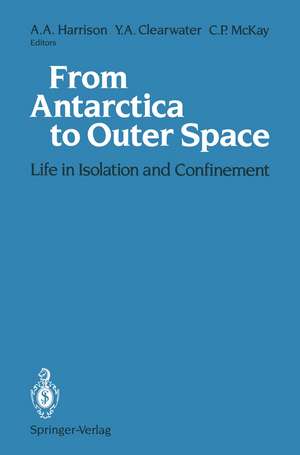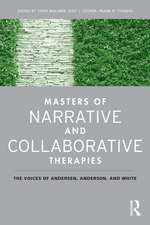From Antarctica to Outer Space: Life in Isolation and Confinement
Editat de Albert A. Harrison Cuvânt înainte de E.K.Eric Gunderson Editat de Yvonne A. Clearwater, Christopher P. McKayen Limba Engleză Hardback – 18 dec 1990
| Toate formatele și edițiile | Preț | Express |
|---|---|---|
| Paperback (1) | 647.08 lei 6-8 săpt. | |
| Springer – 15 aug 2013 | 647.08 lei 6-8 săpt. | |
| Hardback (1) | 653.33 lei 6-8 săpt. | |
| Springer – 18 dec 1990 | 653.33 lei 6-8 săpt. |
Preț: 653.33 lei
Preț vechi: 768.62 lei
-15% Nou
Puncte Express: 980
Preț estimativ în valută:
125.05€ • 135.88$ • 105.11£
125.05€ • 135.88$ • 105.11£
Carte tipărită la comandă
Livrare economică 21 aprilie-05 mai
Preluare comenzi: 021 569.72.76
Specificații
ISBN-13: 9780387973104
ISBN-10: 0387973109
Pagini: 410
Ilustrații: XV, 410 p. 17 illus.
Dimensiuni: 155 x 235 x 24 mm
Greutate: 0.78 kg
Ediția:1991
Editura: Springer
Colecția Springer
Locul publicării:New York, NY, United States
ISBN-10: 0387973109
Pagini: 410
Ilustrații: XV, 410 p. 17 illus.
Dimensiuni: 155 x 235 x 24 mm
Greutate: 0.78 kg
Ediția:1991
Editura: Springer
Colecția Springer
Locul publicării:New York, NY, United States
Public țintă
ResearchDescriere
From Antarctica to Outer Space: Life in Isolation and Confinement aims to revitalize and encourage behavioral research in spaceflight as well as in polar and comparable settings. It comprises a broad collection of papers that evolved from presentations at a three day conference entitled The Human Experience in Antarctica: Applications to Life in Space (The Sunnyvale Conference). This conference was co-sponsored by the Division of Polar Programs of the National Science Foundation and the National Aeronautics and Space Administration and held in 1987. The book provides, through firsthand accounts and research reviews, an introduction to the human facet in isolated and confined environments such as Antarctica, outer space, submarines, and remote national parks. The book discusses some of the theoretical issues underlying research on isolated and confined people, thus demonstrating the applicability of certain general theories of behavior. It also focuses on basic psychological and social responses to isolation and confinement. Studies whose primary purpose is to explore the effects of selection, training, and environmental design on human behavior and mission outcomes are discussed.
Cuprins
I. Settings.- 1. Life in Antarctica.- 2. An Experiential Perspective on Conducting Social and Behavioral Research at Antarctic Research Stations.- 3. A Review of Antarctic Behavioral Research.- 4. Current International Human Factors Research in Antarctica.- 5. The Research Program of the International Biomedical Expedition to the Antarctic (IBEA) and its Implications for Research in Outer Space.- 6. The Antarctic Experience.- 7. Personnel Deployment Systems: Managing People in Polar and Outer Space Settings.- 8. Psychological and Sociological Aspects of Manned Spaceflight.- 9. Scientists and Seamen.- 10. Three Decades of Nuclear Submarine Research: Implications for Space and Antarctic Research.- 11. National Park Service Areas as Analogues for Antarctic and Space Environments.- II. Orientations and Perspectives.- 12. Theoretical Approaches to Adaptation to Antarctica and Space.- 13. Groups in Isolation and Confinement: Environments and Experiences.- 14. Environmental Design Cybernetics: A Relativistic Conceptual Framework for the Design of Space Stations and Settlements.- 15. Small Groups and Confined Microsocieties.- 16. Applications of Living Systems Theory to Life in Space.- III. Isolation and Confinement Effects.- 17. Effects of Isolation on States of Consciousness.- 18. Imaginative Involvement in Antarctica: Applications to Life in Space.- 19. Psychological Effects of Isolation and Confinement of a Winter-Over Group at McMurdo Station, Antartica.- 20. Winter-Over Stress: Physiological and Psychological Adaptation to an Antarctic Isolated and Confined Environment.- 21. Group Adaptation and Individual Adjustment in Antarctica: A Summary of Recent Research.- 22. International Biomedical Expedition to the Antarctic: Physiological Studies in the Field.- 23. The Third-Quarter Phenomenon: Do People Experience Discomfort After Stress Has Passed?.- 24. Communication Issues of Spaceflight.- IV. Interventions and Outcomes.- 25. The International Biomedical Expedition to the Antarctic-Psychological Evaluations of the Field Party.- 26. Crew Selection for an Antarctic-Based Space Simulator.- 27. The Psychophysiology of Adaptation and Competence: Altered States of Consciousness During Antarctic Wintering.- 28. Psychological Effects of Long-Duration Space Missions and Stress Amelioration Techniques.- 29. Proxemics and Privacy: Managing the Problems of Life in Confined Environments.- 30. Functional Esthetics to Enhance Weil-Being in Isolated and Confined Settings.- 31. Windows: Their Importance and Functions in Confining Environments.- 32. Decreasing Stress Through the Introduction of Microenvironments.- 33. Keeping the Peace in Space: A Neighborhood Model for a Community-Based, Conflict-Resolution-Oriented Justice System.- 34. Antarctica and Outer Space: Emerging Perspectives and Perceptions.- 35. Justice in the Antarctic, Space, and the Military.- Conclusion: Recommendations for Future Research.















